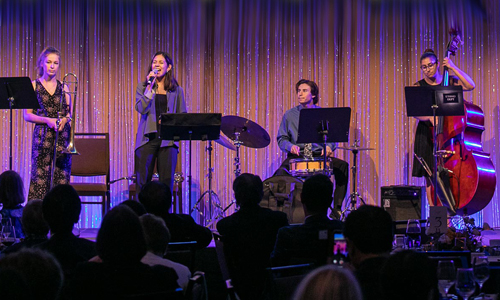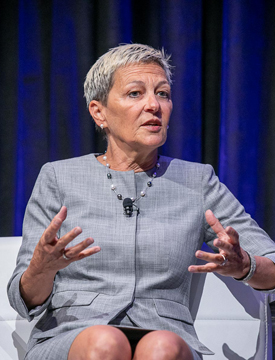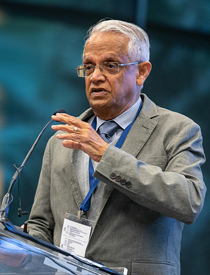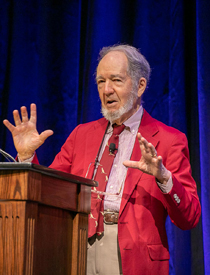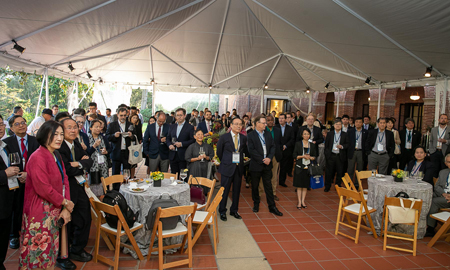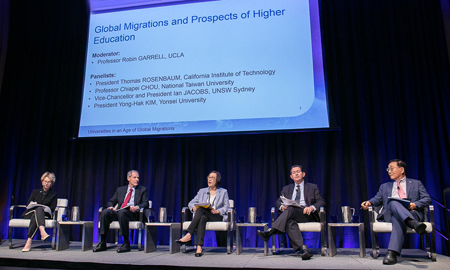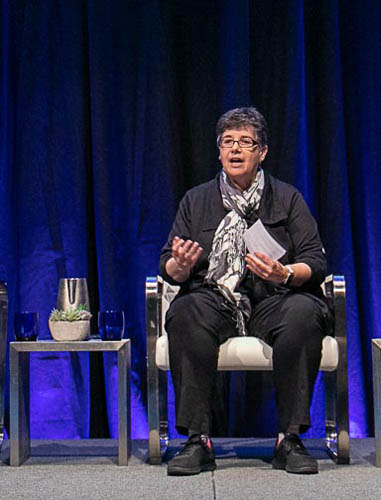The University of Hong Kong hosts APRU Presidents’ Meeting on Sustainable Future Solutions
The 27th Annual Presidents’ Meeting of the Association of Pacific Rim Universities (APRU) was successfully hosted by The University of Hong Kong (HKU) with the theme of “From Invention to Implementation – Solutions for a Sustainable Future.” From June 25 to 27, 2023, the University became a hub for higher education leaders across the Pacific Rim to exchange views and inspire one another with solutions that can bring us closer to a sustainable future.
The event, spanning three days, attracted esteemed presidents and senior administrators representing leading universities to explore innovative ideas and strategies to achieve sustainable goals. It highlighted the need for collaborative efforts in tackling current and future sustainability challenges. The panel discussions centered on topics including the need for fostering research on low-emission energy production and green technologies, the vital role of higher education in providing research-based solutions for future generations and more.
During his welcome remarks, the President and Vice-Chancellor of HKU, Professor Xiang Zhang, emphasised the importance of addressing humanity’s negative impact on the planet. He noted that this cannot be addressed by any single nation but requires a collective effort. President Zhang also highlighted the need for continued commitment to sustainability policies across all areas of human activity.
“As university leaders, we acknowledge that the challenges stemming from climate change demand a united effort from all of us. The APRU network offers a platform for collaboration and the cultivation of innovative solutions to tackle these pressing issues. Through our discussions held during this President’s Meeting, we have the opportunity to harness our collective expertise, empowering the next generation of thought leaders and change-makers with the mindset, knowledge, and skills to create a sustainable future,” said Professor Zhang.
During his opening remarks, Chair of APRU and Chancellor of the University of California Los Angeles (UCLA), Professor Gene D. Block, noted the significance of this year’s meeting hosted by HKU as a platform for higher education leaders to share new ideas and seek solutions to pressing challenges in the region.
“Creating a sustainable future requires all of us to work together in order to find lasting solutions,” Professor Block said. “This is consistent with the collaborative work we do as members of APRU. The bond between our Asia-Pacific universities allows us to address critical global issues that impact so much of our world – even well beyond the Pacific Rim.” He added.
During the panel discussions, university presidents and senior representatives highlighted the vital role of research universities in fostering innovative solutions and leveraging them to drive progress toward a sustainable future. The discussions also underscored the significance of providing equitable and inclusive educational opportunities to the next generation, empowering them to become agents in addressing our planet’s urgent challenges. Additionally, the speakers emphasised the critical roles universities play in developing a systematic approach to mitigate the globally interconnected risks and create solutions for achieving sustainable growth.
The three-day in-person event hosted by HKU proved invaluable in fostering renewed respect and trust among top university leaders, igniting a shared commitment to deeper engagement in shaping the future landscape of higher education. The event showcased the power of leveraging APRU’s network to drive meaningful progress. Education leaders will harness this momentum to sustain collaboration and develop innovative solutions for the pressing challenges facing higher education and society at large.
“The conclusion of the meeting does not mark the end of our discussion. I believe that all APRU members will carry on our missions and work hand-in-hand towards sustainability,” said Professor Zhang in his concluding remarks.
Download event photos here.
June 27, 2023
more
APRU ends pandemic hiatus with first physical meeting at NTU Singapore and highlights urgency to collaborate through international university networks
The 26th Annual Presidents’ Meeting 2022 was the first international in-person meeting for many university presidents worldwide.
More than 100 presidents, university delegates, higher education leaders, and guests from around the world gathered at the 26th APRU Annual Presidents’ Meeting hosted by Nanyang Technological University Singapore, which kicked off on 6 July 2022. Themed “Reconnecting in a Sustainable World”, this APM is the first in-person meeting of APRU since 2019. In the 3-day meeting, speakers and panelists addressed critical sustainability and climate change issues, how to prevent the next pandemic, and the urgent need to collaborate in a post-COVID-19 world. More: www.apru.org
SINGAPORE–(BUSINESS WIRE)–The Association of Pacific Rim Universities (APRU) Annual Presidents’ Meeting 2022 wrapped up in Singapore on July 9th, marking an important milestone as university leaders from at least nine countries gathered together in person as our societies began to open up.
Hosted by Nanyang Technological University (NTU), Singapore, under the theme “Reconnecting in a Sustainable World”, the three-day event saw more than 100 presidents, senior university administrators, and private sector representatives in attendance.
Over six sessions, the participants addressed critical sustainability and climate change issues, how to prevent the next pandemic, and the urgent need to collaborate in a post-COVID-19 world suffering from an alarming trend of international rivalry.
The meeting ended with a firm commitment by the university presidents to pool together their resources by combining the formidable scholarship, research, and innovation on our campuses to help shape a cleaner, safer, more equitable, sustainable, and prosperous world to secure the 21st century for future generations (See Appendix A for the full Presidents’ Statement).
Opening of Annual Presidents’ Meeting 2022
APRU is a network of 60 leading universities linking the Americas, Asia, and Australasia. APRU has members in very diverse contexts, so it is well-positioned to offer relevant expertise from around the region.
NTU Singapore President Professor Subra Suresh said in his opening remarks: “For the first time since 2019, this in-person meeting brings together presidents of some of the world’s leading research-intensive universities from around the Pacific Rim. As we gather at this pivotal moment, let us pledge to create a roadmap for compelling action-oriented cooperation and make a positive contribution in a transformed world.”
Fireside Chat with Mr. Piyush GUPTA
DBS Chief Executive Officer Piyush Gupta discussed sustainability issues, suggesting that universities and businesses like DBS should explore co-creation and research to combat climate change. They should also partner to train the workforce in the sustainability field by providing grants, for example. “The private sector and the corporate world are serious about putting money behind these big issues. Just the motivation of being able to fund some research helps businesses and universities come together,” Mr. Gupta said.
The subsequent meeting’s sessions highlighted a wide range of critical concerns. They were held under the themes Responses to Crisis in a Diverse Region; Sustainability and Climate Change; Preventing the Next Pandemic; and Reconnecting: The New Urgency for Collaboration. Panelists representing different regions shared their experiences building resilience against the challenges (See event rundown).
Responses to Crisis in a Diverse Region
The biggest challenge to many universities has been the pandemic over the past few years. Provost and Executive Vice President Kwang-Jae Kim, POSTECH in Pohang, Korea, explained that POSTECH had taken steps to expand the university into a Metaversity—a combination of the words, Metaverse and University. “We decided to introduce virtual reality work through VR technologies in some undergraduate classes. We provided VR devices to all freshmen students for the lab classes in physics, so students can experience the experimental scenes using the VR devices just as if they were participating in the actual experiment,” Prof. Kim said. “In addition, we provided experimental kits to students. We sent the kits to their homes so the students could do the actual experiments themselves at home by just following the VR directions. And we built a specially designed classroom with a VR-AR augmented reality and mixed reality capabilities.”
Chancellor Gary S. May, the University of California, Davis in the United States, identified several substantial commonalities in the responses to various crises we discussed between the different regions while finding some notable differences. “The concept of the Metaversity I thought was very interesting. For one of our panelists, that is inclusive of activities like eSports and campus sharing. Regarding the climate change crisis, we talked about our various activities in the evolution toward carbon neutrality and how we’re addressing the UN sustainability goals. Finally, on the aging demographic crisis, we heard about attracting international students to the university and internationalization at home as possible solutions to that particular situation,” Prof. May, said.
“In the spirit of thinking about actionable responses from the APRU community…We’ve collected a lot of data over the past few years particularly relevant to the pandemic and (we should think about) how can that data be shared for productive and constructive solutions to potential new crises, including perhaps the next pandemic.”
“We all agree that APRU is an important network…(On) the idea of building standards for education, now we have lots of micro-credentials; we have online distance learning and whatnot. Many universities are engaging with all these education techniques, and there is no one standard. Should we have one under the umbrella of APRU? That’s a question that (we) probably have to answer.” Vice-Chancellor Mohd. Hamdi Abd. Shukor, Universiti Malaya in Kuala Lumpur, Malaysia added.
Sustainability and Climate Change
On July 8th, the panelists discussed advancing the climate change agenda. In a few snapshots taken from the meeting’s many insightful exchanges, President and Vice-Chancellor Joy Johnson, Simon Fraser University in British Columbia, Canada, zoomed in on universities’ moral obligations to protect the vulnerable in surrounding communities. She recalled that 2021 was a devastating year for her province. British Columbia experienced an extreme heat wave where temperatures exceeded 40° C. 619 deaths were attributed to a weather phenomenon known as the “heat dome”. Prof. Johnson noted that these deaths occurred among the elderly and the homeless – vulnerable populations. In addition, recently released research suggests that a billion sea creatures were killed due to the heat.
“I do believe that the president’s role is to try being a beacon of hope in this time because it does feel a little bit dark…Climate change is very much on our mind, and I believe that universities have a moral obligation to think about our commitments, given that we have the people, the infrastructure, the research, and the engagement capacities,” Prof. Johnson added.
For his part, Executive Vice President, International Affairs, Toshiyuki Kono, Kyushu University in Fukuoka, Japan, illustrated how universities could continue to lead by example. He described Kyushu University’s new campus, explaining how it manages to embrace both its history and its future. The site was already mentioned by Chinese literature in the 3rd Century AD. “We kept the green areas, groundwater, landscape, and historical remains, but this campus is also designed for next-generation technologies with comprehensive research centers,” Prof. Kono said. “We have established three priority areas: decarbonization, medicine and health, and environment and food. And specifically, decarbonization is one of the significant research areas we wish to focus on in our cooperation with the APRU network. Last year, we also established the Research Center for Negative Emissions Technologies. Professor Shigenori Fujikawa, one of the star researchers at our university, developed 30 nanometer-thin sheets so that we could collect CO2 from the atmosphere. He’s trying to make social implementation. If it can be implemented properly, you can collect CO2 everywhere worldwide. He named it a ubiquitous negative emission. The idea is that carbon-neutral is not enough, the time doesn’t wait. So we must collect the CO2 in the atmosphere and make it negative.”
“We have been very active in the area of hydrogen research. And this research focuses on fundamental methods of hydrogen production, storage, transport, and utilization…Our main Ito Campus has installed an Ene-Farm energy generation system, contributing to Toyota’s 2021 hydrogen fuel vehicle Mirai and its hydrogen station. The campus is the testing ground for hydrogen energy; this is a long-run project. We are committed to achieving a sustainable energy society by advancing our hydrogen research and education.” Prof. Kono added. “Last but not least, we were privileged to host a five-week webinar series on sustainability in the framework of APRU. This webinar series focused on the realization of a decarbonized society to combat climate change. It brought together a diverse group of experts and researchers focusing on early career researchers, to exchange ideas and explore potential cross-disciplinary collaborations to develop solutions.”
Preventing the Next Pandemic
The panelists also investigated what universities can contribute to preventing the next pandemic by addressing issues of global governance, as well as improved public health strategies and the sharing of intellectual property on biomedical discoveries.
The APRU Presidential Working Group provided an update on how their concerted efforts have played a role in helping APRU members demonstrate global leadership In preventing the next pandemic. According to President and Vice-Chancellor Santa J. Ono, The University of British Columbia in Vancouver, Canada, “the working group is focused on bringing together resources and presenting recommendations for action in the following areas:
– assembling scientific research assets in biomedical technology and therapeutics for APRU’s 60 member universities as a major global resource for responding quickly to the next pandemic;
– implementing strategies for combating the infodemic through science and media literacy and other initiatives, taking into account diverse cultural settings;
– and compiling a handbook on pandemic crisis management in various societies, which record lessons from COVID-19 while looking to future requirements in a world increasingly affected by inequality and climate change.”
Prof. Rocky S. Tuan, Vice-Chair of APRU and Vice-Chancellor and President of The Chinese University of Hong Kong in Hong Kong, China, identified social and cultural determinants of public health strategies. Nine APRU member universities looked at more than 90 different sources of studies published in highly reputable journals, such as The Lancet, Nature, PNAS, etc., and studies performed in different parts of the world. “Further analysis shows that resistance to intervention was relatively strong in individualistic societies. Whereas conformism was relatively common in societies high in collectivism and subordination to the powerful others,” Prof. Tuan said. “What is the strategy forward? When it is an endemic disease, we should increase trust in science and public institutions and develop efficient global epidemic watch and alert systems. We should promote early compliance with interventions through effective communications when it is an epidemic disease. And once you go to post-pandemic, you can talk about post-pandemic public education to increase pandemic awareness and strengthen civic values. These strategies are helpful in all societies. But particularly important in individualistic societies.”
“What should APRU do? I can think of a number of things such as exchanging ideas and information, consulting each other in terms of best practices, enhancing and developing scholarly and research collaborations, and enriching student experience,” Prof. Tuan added.
The group will convene a major international symposium in November 2022 during the APEC Leaders’ Week and APEC CEO Summit week. President Bundhit Eua-arporn, Chulalongkorn University in Bangkok, Thailand, expressed confidence that the forum will help universities across the globe to build international cooperation, develop new knowledge on challenges facing the region and contribute to social and economic advancement.
“This platform will also provide opportunities for participants from all sectors to share their experience in their preparation for handling new challenges, especially during this period of uncertainty, in which mutual collaboration is needed more than ever,” Prof. Eua-arporn said.
Reconnecting: The New Urgency for Collaboration
Finally, panelists shared their unique experiences and visions of how higher education institutions may work together to address imminent regional and global issues and shape a sustainable future.
“Last year at UQ, we launched our Global Development Impact Plan to coordinate our global development expertise better and help address shared challenges and affect social change. As part of this plan, we articulated our focus on helping to build the global capacity of people and organizations to achieve their sustainable development goals. We believe we can make a difference in agriculture and food sciences, understanding and combating natural hazards and providing leadership, governance, and management programs in developing countries. We also believe we have a role to play in helping to provide higher education opportunities to our neighboring nations,” shared Vice-Chancellor and President Deborah Terry, The University of Queensland in Queensland, Australia.
“While devastating and challenging in so many ways, the pandemic also presented opportunities, one of which is the potential for new education models, which could assist UQ and other universities to help meet the educational needs of our region…A forum such as the APRU Annual Presidents’ Meeting will help us to reconnect and explore these possibilities.”
Prof. Kathy Belov, Pro-Vice-Chancellor (Global Engagement), The University of Sydney in Sydney, Australia, introduced a new program, the APRU Biodiversity Program. “We have lost 80% of our insect biomass in the last 30 years, 80%. In 50 years, we’ll only have half of what’s left now. And in 100 years, all of our insects will be gone…Our insects are at the heart of our food webs, pollinating our plants…We aim to leverage our expertise within APRU universities to conserve our unique biodiversity. So we’re going to foster collaboration to catalog, study and conserve the biodiversity in our region. We want to capacity build and train particularly HDR and postdoc students. And we want to focus on ethical, legal, and social issues. And of course, justice, equity, diversity, and inclusion,” Prof. Belov said.
“At the moment, a million plant and animal species are threatened by extinction. That’s about 28% of all species that we know about. It’s recently been said that this is the sixth great extinction spanning geological time, but humans entirely drive it.” Prof. Belov added. “The challenge is getting access to the samples, preserving those samples well, not the sequencing, but the analysis of all the data because this will generate a huge amount of data. And I think this is where APRU can come in…The Pacific Rim is full of amazing biodiversity. And I think there are something like 17 countries known to be biodiversity hotspots, and about 13 or 14 are in the Pacific Rim. So what we’ve done is we’ve set up a steering committee. I’m keen that we consider engaging our academics, postgraduate students, and postdocs. Together, we can be going out and sampling our biodiversity, studying our biodiversity, and more importantly, all the data analysis that comes with it.”
“In our case, we had a 2011 Great East Japan Earthquake, we lost 20,000 people, and the Fukushima incident was associated with it. In response, we have established the International Research Institute of Disaster Science (IRIDeS) next year, and APRU agreed to launch the APRU Multi Hazards Program…The basic message of risk reduction is that if we invest earlier, we can suppress many costs that once things happen. The costs include, of course, human as well as financial costs.” said President Hideo Ohno, Tohoku University in Sendai, Japan.
“We had this in-person APRU Multi-Hazard Summer School, and it was reasonably popular, but suddenly, when we made it online, the 2020 version was a three-day program. We had almost 850 participants, so apparently, there are interests and needs in this type of activity. We had the summer school visit places affected by earthquakes and tsunamis. Although we share lessons learned from our experiences, we also learn from the participants’ experiences…We also have an APRU Multi-Hazard Campus Safety Program. Another thing that we did together with our APRU members is this ArcDR3 exhibition of future urban design. This exhibition was first shown in Tokyo this year and will be shown in Los Angeles later this year. Eleven universities got together and formed seven regenerative cities, meaning that it’s how to cope with all kinds of disasters.”
“We also make International Organization for Standardization (ISO) on disaster prevention. By standardizing it, we can use this equipment and many means all over the place. So that will be published hopefully by 2023.” President Hideo Ohno added. “So we want to use this Fukushima as a ground to do these proof of concept activities. We will have the 10th anniversary of the APRU Multi-Hazard Program late this year in Bangkok. Next year, we will have an APRU session at the World BOSAI Forum, a Japanese disaster risk reduction forum in Sendai. So, we look forward to putting this disaster (reduction) level to the next level. I think it’s urgent.”
Highlights of Global Reports
The APRU Annual Presidents’ Meeting 2022 saw the release of four global reports from within the APRU network. Chair of APRU and Chancellor of the University of California, Los Angeles, Professor Gene Block, and Secretary General of APRU, Dr. Christopher Tremewan, announced the release of the APRU Annual Report 2022, highlighting APRU institutions’ actions and collaborations throughout the pandemic and amid continuing global geopolitical tensions.
APRU also launched a joint report with Elsevier entitled For the Global Common Good: APRU and the China-US Research Landscape. Vice President, Global Strategic Networks at Elsevier, Dr. Anders Karlsson, discussed the report’s findings, highlighting the importance of maintaining research collaborations, especially on the UN Sustainable Development Goals.
NTU Singapore, for its part, presented its Report on NTU’s Carbon Footprint Framework and Roadmap, which includes a tool for institutions such as universities worldwide to measure their carbon footprint. The second NTU Singapore report released at the meeting was the Report on Resilient Universities during the COVID-19 pandemic; Differences between East and West. The report highlights the best practices by universities in various countries in their response to the COVID-19 pandemic.
About APRU
As a network of 60 leading universities linking the Americas, Asia, and Australasia, APRU brings together thought leaders, researchers, and policy-makers to exchange ideas and collaborate on practical solutions to the challenges of the 21st century. They leverage their members’ collective education and research capabilities into the international public policy process. In the post-pandemic era, their strategic priorities focus on providing a neutral platform for high-level policy dialogue, taking actions on climate change, and supporting diversity, inclusion, and minorities. APRU’s primary activities support these strategic priorities with a focus on critical areas such as disaster risk reduction, women in leadership, indigenous knowledge, virtual student exchange, esports, population aging, global health, sustainable cities, artificial intelligence, waste management, and more.
To learn more about APRU, please visit www.apru.org.
About Nanyang Technological University, Singapore
A research-intensive public university, Nanyang Technological University, Singapore (NTU Singapore) has 33,000 undergraduate and postgraduate students in the Engineering, Business, Science, Medicine, Humanities, Arts, & Social Sciences, and Graduate colleges.
NTU is also home to world-renowned autonomous institutes – the National Institute of Education, S Rajaratnam School of International Studies, Earth Observatory of Singapore, and Singapore Centre for Environmental Life Sciences Engineering – and various leading research centres such as the Nanyang Environment & Water Research Institute (NEWRI) and Energy Research Institute @ NTU (ERI@N).
Under the NTU Smart Campus vision, the University harnesses the power of digital technology and tech-enabled solutions to support better learning and living experiences, the discovery of new knowledge, and the sustainability of resources.
Ranked amongst the world’s top universities, the University’s main campus is also frequently listed among the world’s most beautiful. Known for its sustainability, over 95% of its building projects are certified Green Mark Platinum. Apart from its main campus, NTU also has a medical campus in Novena, Singapore’s healthcare district.
For more information, visit www.ntu.edu.sg
Contacts
Media:
Jack Ng
Director, Communications
APRU
Email: [email protected]
Lester Kok
Senior Assistant Director
Corporate Communications Office
Nanyang Technological University, Singapore
Tel: 6790 6804; Mobile: 9741 5593
Email: [email protected]
Event photos: link
Appendix A — APRU 26th Annual Presidents’ Meeting 2022: Reconnecting in a Sustainable World — Presidents’ Statement
July 9, 2022, Singapore
Following a substantive exchange of ideas at the Annual Presidents’ Meeting of the Association of Pacific Rim Universities (APRU), held at Nanyang Technological University, Singapore (NTU, Singapore) from 6th to 9th July 2022, we pledge to put our resources to bear by combining the formidable scholarship, research, and innovation on our campuses to help shape a cleaner, safer, more equitable, sustainable, and prosperous world.
We build on the momentum generated during the Covid-19 pandemic in which universities made crucial contributions alongside other major stakeholders in the successful development of the vaccine with unprecedented speed and efficacy and the formulation, analysis, and deployment of pivotal public health policies and practices. APRU members will endeavour to continue making transformative changes to education and learning by deploying cutting-edge and appropriate technologies and new approaches to learning suited to a post-COVID world. We are committed to enhancing global health and well-being with game-changing discoveries led by a diverse community of our scholars, innovators, and change-makers. We also pledge to identify more robust pathways and safeguards to prevent the next pandemic. Never has our role been more critical in improving the health of our planet and people. Never has the convergence of education, technology, and innovation better prepared us for this enormous task.
As the world faces surging geopolitical tensions, we will strive to keep our doors open for debate, dialogue, connection, and collaboration. We will continue to build on our work to embrace and endorse the United Nations Sustainable Development Goals that include such issues as climate change, health, disaster risk mitigation, mobility of students and researchers, and reducing inequality within and among our communities, in the geographic, societal, and cultural context of each of our institutions.
We will strive to build greater trust and resilience among countries and people in the Asia Pacific region and across the world. In new and innovative ways, we will endeavour to find impactful solutions to diminish the risks of climate change and the next global health crisis.
With our collective ingenuity and commitment, along with our individual strengths and unique approaches to address local, regional, and global challenges, we will help shape a more sustainable future through our efforts in education and lifelong learning, human talent development, scientific discoveries, technological innovation, and service to society. We take this responsibility seriously and with utmost sincerity and will make every effort to secure the 21st century for future generations to come.
July 14, 2022
more

